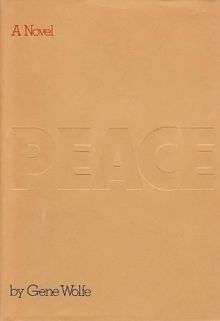Peace (novel)
Peace is a psychological fantasy/ghost story novel by American writer Gene Wolfe, published in 1975. It is the story of a man from a small Midwestern town in the early to mid-20th century, Alden Dennis Weer, who narrates various memories from different parts of his life, including his childhood, early adulthood, and middle to old age.[1][2]
 First edition | |
| Author | Gene Wolfe |
|---|---|
| Genre | Fantasy |
| Publisher | Harper & Row |
Publication date | 1975 |
| Media type | |
| Pages | 264 |
| ISBN | 0-06-014699-0 |
Style and interpretations
Unlike a lot of Wolfe's work Peace is a standalone novel set in a somewhat contemporary time and place (as opposed to the future or an imaginary world). Despite this, the story of the novel is one of Wolfe's strangest and most difficult; the narrator's consciousness at times seems to transcend time and space, as if he's narrating from beyond our plane of reality. One interpretation is that the narrator, Weer, is dead, and the scattered memories are those of a ghost; in 2014, Wolfe confirmed that this was his intention.[3]
Different critics interpret differently what is actually happening in the novel,[4] and another interpretation is that the memories of his old age are the fantasies of a middle-aged Weer, who is experiencing a nervous breakdown. The novel includes subtle clues to guide the reader's understanding of the story, although the mysteries behind these clues have been hotly debated.[5]
As in many of Wolfe's novels, much of Peace is taken up with stories within stories, particularly stories told to Weer as a child.[1] Many of the key events of the novel are not explicitly narrated, but can be inferred or guessed at based on information in the stories-within-stories.
Commentary
Wolfe has described Peace as his favorite of his own work, as it is the one where he came closest to achieving his original goals. Neil Gaiman, who has frequently praised the novel, said: "Peace really was a gentle Midwestern memoir the first time I read it. It only became a horror novel on the second or the third reading."[6]
References
- Joan Gordon (1986). Gene Wolfe. Wildside Press. ISBN 978-0-89370-956-3. Retrieved 2011-12-20.
- Philip Raines. "Peace: Fantasy Masterworks 28". Infinity plus. Retrieved 2011-12-20.
- A Q&A with Gene Wolfe, by Jason Pontin; in MIT Technology Review; published July 24, 2014
- Robert Borski. "The Devil His Due: Gene Wolfe's Peace". Sirius fiction. Retrieved 2011-12-20.
- Mordicai Knode, "Gene Wolfe's Peace Will Leave You Anything But Peaceful," Tor.com, October 26, 2012. Retrieved 2013-10-22.
- Neil Gaiman, "How to Read Gene Wolfe," Fantasy and Science Fiction, April 2007. Retrieved 2013-10-22.